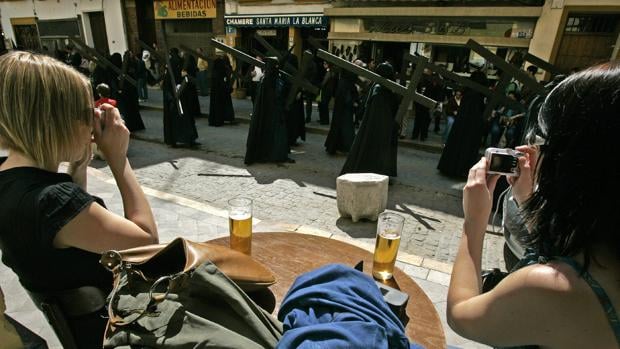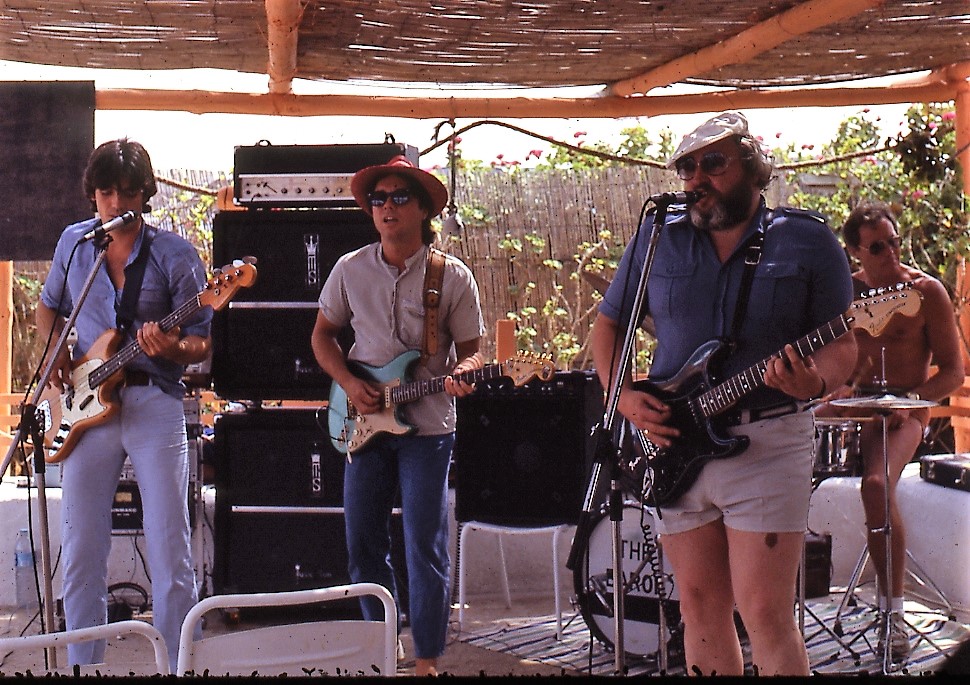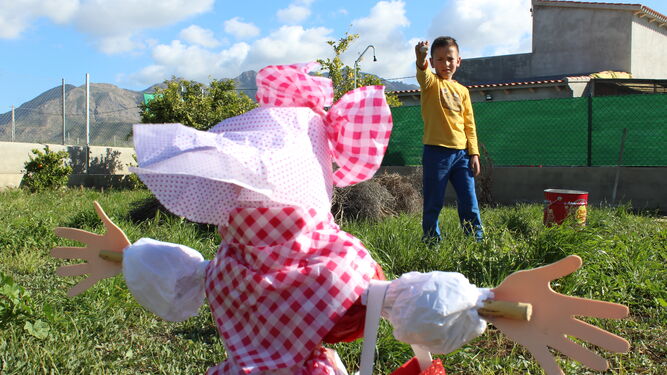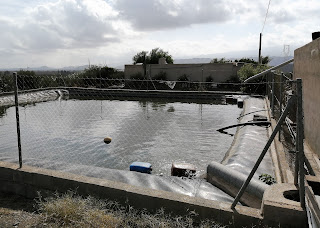We enjoy two winters here in Almería, the proper one, which lasts for a few months and is usually passably survivable, and the tourist one, which lasts rather longer. The first is a spell of cold, with some rain and even occasionally some snow. The second is far longer.
It's the time when the town's businesses must rely on those who live there: the residents.
We will have had a couple of biblical events to keep us cheerful – a major flooding perhaps or a cliff collapse. A road is blocked and a pipe freezes. The imported foods pavilion is briefly out of tea-bags and the price of long-sleeved tee-shirts went up slightly and word reached us of a British cabin crew on strike.
I have spent most of our winter out in the garden cutting down trees
and sawing up firewood for the evening’s entertainment, in front of the
telly. The rest of Europe pretends that they are managing just fine,
thank you, while well aware that we are doing a lot better down here.
Perhaps, as a recent survey suggests, 44% of the people remaining in
Britain will decide to take up their inclination to move ‘overseas’, and
it coul d
be that a few of those, attracted by our weather, will head in this
direction, their cheque book and the phone number of a really good
lawyer in their inside-pocket.
d
be that a few of those, attracted by our weather, will head in this
direction, their cheque book and the phone number of a really good
lawyer in their inside-pocket.
But our physical winter, three months of so-so weather, followed by nine months of sun, is inverted when it comes to ‘the season’. Excepting Christmas and Easter, and there are eight and a half million people on the roads during this week – the tourist season itself runs from mid-June until mid-September, coinciding neatly with the opening periods of the wealthier discothèques, beach-bars and hotels. So the nine months in the figurative winter of empty beaches and delightful walks in the hills and the three months of the tourist-summer (horrible, far too hot – a perfect time to go and visit someone elsewhere), leave us in reality with six months of perfect warm weather and splendidly quiet and peaceful life without queues, noise and people in the supermarkets wearing nothing more than sunburns and swimming trunks and shouting at the check-out staff.
This perfect period, divided as it is by the summer high-season into two, is due to start right after Easter. No more rain and too early for any traffic-jams. Three months, less these few days over Easter, when the tourists are still wherever tourists come from, working in some niner to fiver and thundering twice daily through the hyperborean night in uncomfortable passenger trains dreaming of some far-off break abroad where they can raise some hell. Don’t you miss it?
As we consider our good fortune to live here, at least during the major part of the year outside that brief and savage summer onslaught, we go about our unspoken business of turning our adopted pueblos into true communities. We paint our houses, trim the gardens, scoop up the dog-poop, rehearse for the summer comedy play and collect money for the cats home.
Meanwhile, the Spanish authorities, the politicians and the bankers, have all decided that tourism is the panacea to the country’s problems. Pack ‘em in tight and lock the doors. Sex, sea, sun and sangria. And then, keeping with that particular letter from the alphabet, when they've spent their savings, they can sod off back home. The recipe has worked well enough in the past twenty years and so it has to keep on going. Benidorm is a veritable wonder. A few towns across the country have actually increased their volume in the last season – well, in 2018 anyway, before the records were all burned. My own home-town of Mojácar, which miraculously decided not to attend the Fitur world tourist fair in Madrid back in January, has been singled out for criticism recently as having ‘obsolescent and mature’ hotels – which is bean-counter-speak for it’s time to demolish and rebuild several of our steamier tripperdromes. Who knows? Perhaps just knock them down and be done with it. To be fair (who, me?), Mojácar in fact has some modern establishments and it also has the Parador, a hotel which actually attracts wealthy people who spend money.
Spending money, you see, is the whole point of tourism, but don’t tell the government accountants who are much more interested in numbers rather than in results.
The average visitor to our province is here for five days.
The average resident is here all year long. And next year too.
See, so he spends more.
In fact, tourism is a shaky premise anyway, as a cheaper or brighter or jollier new place elsewhere, in Cyprus or the Dominican Republic or Croatia or Murcia, can leave your resort dead in the water from one season to the next. The beginning of a two-year long pandemic or a terror-bombing, or a hotel collapse, or even a tour company going bust can halt tourism overnight. They won't come, but we residents will remain (I mean, during a really terrible war, who is gonna buy the house anyway?).
Tourists, particularly the ones who ‘work hard for fifty weeks a year’ are not necessarily loyal to a particular destination. They want to let their hair down. Cheaply.
A report of typhus or man-eating jellyfish can empty out a resort in a jiffy. The brush-fire that scorched Mojácar a few years ago and burnt down a few houses was considered of little importance by the town hall. However, they were concerned of losing their tourists and actually obtained funds from the Andalusian government, not to rebuild, replant or repair, but to help promote their hotels. Please don't believe what is being said about us in The Express, they wailed, read the spanking full-page colour advert in the Voz de Almería!
The ministry of tourism, sports, business and dental floss is aware of this and is tossing obscene amounts of money at the job of promoting Andalucía, which involves the usual tactics and targets which have been used since Hannibal showed up with his elephants. There was a huge Andalucía pavilion at the Berlin Travel Show last month, and no doubt much business was made as exhibitors from one stand went and visited those from the one next door. Videos, key-rings, postcards, calendars, a couple of clog dancers, a small bowl of traditional food (who really eats garullos in real life?) and a hundred other time-wasters were all rolled out. The real business, of course, offering hotels with hundreds of beds, or chains of hotels with thousands of beds, for a slightly cheaper price than the competition, is all done elsewhere and at a different time.
The ‘experts’ try and promote new ideas. Forget the tired old sol y playa, they say (which accounts for 99% of all tourism – how many package-hotels are there in Jaén?); how about gastronomic tourism? (Pass the garullos, they smell delicious), or agro-tourism. I'm sorry - after fifty weeks of stuffing toothpaste into a tube, the head of the family wants to go and look around a tomato plantation under plastic?
But it’s not really convincing, despite the businesses that cater to the tourist trade; the hotels, discos, nick-nack shops and all doing their level best to try and increase not only the number of visitors – which is bad enough for the all-year long residents – but the length of the season as well. All it means is that it's harder to park, harder to shop and where the local village fiestas and concerts are aimed, no longer at the villagers themselves, but at the visitors with their swollen wallets. Hurry, Jim, there may be some room at the back.
It is said that every foreign home-owner (who puts a fortune into the community while yearning for peace, beauty, safety and other noble improvements) started out as a tourist. But, despite the efforts of the tourist board to the contrary, the best tourists are those who come under their own steam and search out the places, restaurants and shops which appeal to them. It’s not much use to local business when five hundred people are having a micro-waved lunch in the 20€ a day hotel down the road.
But let’s not worry about this small cloud on our horizon, as we now have three months when the weather is perfect, the roads are empty and the barman still remembers our name.

 Mor
Mor

